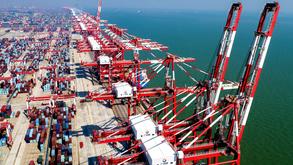 This undated photo shows a view of Nansha Port in Guangzhou, south China's Guangdong Province. (GUANGZHOU PORT AUTHORITY / XINHUA)
This undated photo shows a view of Nansha Port in Guangzhou, south China's Guangdong Province. (GUANGZHOU PORT AUTHORITY / XINHUA)
China's high-level opening-up has accelerated in recent years, with 21 free trade zones (FTZs) having been set up so far, highlighting their role as testing grounds for the policy.
These zones have either played a vital role in promoting innovative achievements in specific areas or across the whole nation, and they will help facilitate China's dual-circulation economy, in which domestic and overseas markets will reinforce each other, with the domestic market as the mainstay.
Yiwu, a city in the eastern province of Zhejiang that has been dubbed "the world's supermarket", is one of these FTZs, bringing fresh impetus to China's foreign trade growth. In September, it became part of the China (Zhejiang) Pilot Free Trade Zone.
As impetus for the Yiwu FTZ's goal of convenient transportation, the Yiwu-Xinjiang-Europe freight train, one of many China-Europe express services, has been a strong driving force for the stability of global industrial and supply chains, promoting China's dual-circulation model.
As the COVID-19 pandemic has greatly affected sea and air transportation capacity, China-Europe freight train services have played a significant role in stabilizing international railway logistics.
Last year, the value of the Yiwu Free Trade Zone's cross-border renminbi settlements hit 18.5 billion yuan (US$2.8 billion), a year-on-year rise of 115 percent, according to a report released by the zone at the end of last month
Their stability and all-weather features have ensured the smooth transportation of goods, including epidemic control materials. To meet surging demand, service operators have been working overtime, even during the Spring Festival holiday.
Lin Huihuan, general manager of a logistics company in Yiwu, said: "In previous years, the Spring Festival holiday only saw a few Yiwu-Xinjiang-Europe freight train services carrying cargo that was leftover from before the holiday. However, this year's holiday saw more new cargo being transported on a daily basis. My company alone prepared enough cargo to be carried by five Yiwu-Xinjiang-Europe freight train services."
The city's freight services achieved sparkling results last year: the number of routes in operation rose to 14; and 974 freight trains departed the city, shipping 80,392 twenty-foot equivalent unit containers, a year-on-year rise of 90.2 percent.
ALSO READ: MOC: China to deepen reforms in pilot FTZs
In a further development, the huge potential created by the Yiwu FTZ has encouraged a growing number of foreign businesspeople to start operations in the city.
To make it easier for them to adapt to local life and play a role in the city's development, the Yiwu government opened the Jincheng International Home, Zhejiang's first immigration service center, in June. Located near the Yiwu International Trade Market, the facility provides expats with services such as clarification of immigration policies, visa expiration reminders, guidance on online administration and dispute resolution.
"I can talk to my guests in Mandarin now, and they all say my Mandarin is much better than before," said a foreign businessman who came to Yiwu four years ago and lives in the Jincheng community. He always participates in the Chinese language salon organized by the Jincheng International Home and has made great progress.
Song Li, director of the Yiwu Exit and Entry Administration Bureau, said, "As Yiwu strives to facilitate construction of the FTZ, the city will introduce more foreign enterprises and overseas high-end talent in the future, while service organizations and institutions for expats will also be gradually established, strongly optimizing Yiwu's business environment."
Last year, the value of the Yiwu FTZ's cross-border renminbi settlements hit 18.5 billion yuan (US$2.8 billion), a year-on-year rise of 115 percent, according to a report released by the zone at the end of last month.
READ MORE: China's FTZs deepen new era of reform and opening-up
The report said 5,178 new enterprises were added to the zone from September to December, a rise of 268 percent from the first eight months of last year.
Cai Jingwen contributed to this story.


